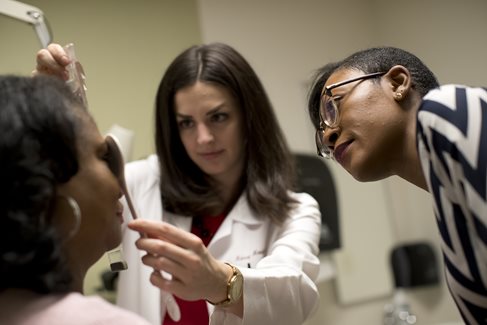Save Your Vision In March and All Year Long
 March is “Save Your Vision” month. The movement to save your vision serves to raise awareness of the importance of annual comprehensive eye examinations.
March is “Save Your Vision” month. The movement to save your vision serves to raise awareness of the importance of annual comprehensive eye examinations.
Many people believe that being able to see well means good eye health. However, this is not always the case. An eye exam should consist of more than screening for changes in your contact lens or glasses prescription. There are numerous conditions and disease processes that can happen without showing any symptoms. According to Prevent Blindness America, glaucoma, the second leading cause of blindness, affects more than 2.3 million Americans over the age of 40. Furthermore, there are also another 2 million people who do not even know they have the disease.
Optometrists and optometric interns at The Eye Institute (TEI) not only screen for refractive changes in glasses and contact lens prescriptions, but they also examine overall eye health. In most cases, to receive the best evaluation, an optometrist may ask permission to use ophthalmic drops to dilate eyes or make them larger in order to get a better look at the health of the back of the eye and the optic nerve. The back of the eye houses the retina, which is a structure that receives focused light and converts it to a neural signal that can be read by the brain in order to see something. Many diseases and abnormalities manifest themselves at the back of the eye, and that is why it is important to have a comprehensive eye examination, and not just a refraction.
 What many do not realize is that eyes are regarded as a window to the health of your entire body. Often times, eye doctors are the first to inform a patient about certain systemic health issues like diabetes or hypertension. Studies show early detection and treatment can prevent or delay blindness due to diabetic retinopathy in 90 percent of people with diabetes, yet 50 percent - or more - of those diagnosed choose not to receive eye examinations or are diagnosed too late for effective treatment.
What many do not realize is that eyes are regarded as a window to the health of your entire body. Often times, eye doctors are the first to inform a patient about certain systemic health issues like diabetes or hypertension. Studies show early detection and treatment can prevent or delay blindness due to diabetic retinopathy in 90 percent of people with diabetes, yet 50 percent - or more - of those diagnosed choose not to receive eye examinations or are diagnosed too late for effective treatment.
A full comprehensive dilated exam is the standard of care. Through monitoring for changes and abnormalities in eye health, optometrists at TEI are able to prevent or better manage conditions such as glaucoma and macular degeneration.
Although some insurances only cover an eye exam every other year, it is very important to be evaluated annually. The first step to saving your vision is to make an appointment for an eye exam.
TEI suggests these tips to help protect your eyes and save your vision:
- Wear sunglasses to protect eyes from harmful UV rays. It is important to wear sunglasses during the daytime even on cloudy days. UV rays are present all the time, in every type of weather.
- Wear protective eyewear or goggles when playing sports such as hockey to prevent eye injuries.
- Do not over-wear contact lenses. If wearing a monthly replacement lens, the lens is only safe to use for 30 days after the package is first opened, not for 30 wears spread out over a long period. If you do not wear your contact lenses often, consider switching to a daily contact lens.
- Do not sleep in contact lenses. Sleeping in contact lenses decreases the oxygen supply to the cornea and can lead to sight-threatening conditions and infections.
- Consume colorful and green, leafy vegetables such as carrots, spinach, broccoli, and kale that contain vital nutrients for the eyes.
- Do not use tobacco products. Smoking or using any form of tobacco has devastating effects on vision, eye health, and overall systemic well-being.
- Limit digital screen time. Studies show a correlation between blue light exposure and the onset of macular degeneration. Not to mention, staring at screens for prolonged periods of time can lead to symptoms such as headaches and eye strain. Use the 20-20-20 rule, which suggests that every 20 minutes, take a 20 second break from the laptop, computer, tablet, or mobile device, and focus the eyes on something in the distance 20 feet away.